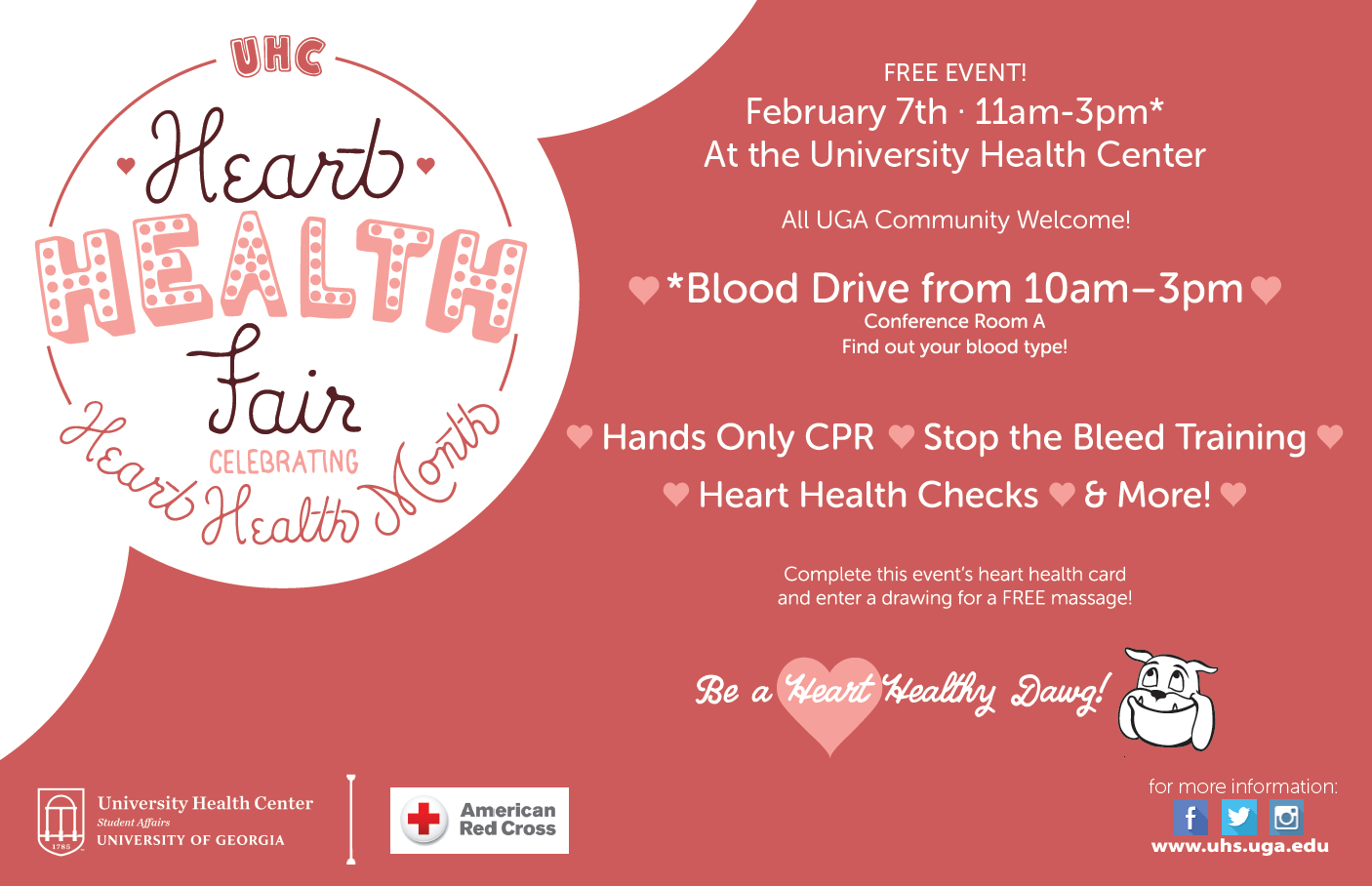Be A Heart-Healthy Dawg
February is Heart Health Awareness Month – the perfect time to start working toward heart health goals! There are many ways to maintain a healthy heart. Below, we have listed just a few.
For more heart health information, visit the University Health Center’s Heart Health Fair on February 7, 2018 – 11am-3pm at UHC. This event is hosted in collaboration with the American Red Cross. You can sign up to give blood here using code “UGA.”

Heart Health Tip #1: Increase Physical Activity
The American Heart Association encourages Americans to increase physical activity with the aim of achieving 150 minutes of aerobic activity per week, combined with strength training a couple of days per week. This can be accomplished in different ways such as five 30-minute sessions or three 75-minute sessions per week. (Note: It may be advisable to check with your health care provider before beginning a new physical activity routine. Meet your on-campus primary care provider by scheduling a UHC visit online!)

Small changes can make a difference. Try adding 10 minutes of physical activity at a time. Not a fan of the gym? Instead, find activities you enjoy. For example:
- Take a walk around the building at lunch.
- Park your car in a lot farther away from your office/classroom building.
- Join a team sport.
- Walk your dog with a friend.
Heart Health Tip #2: Shake Up Your Eating Habits
According to the American Heart Association, there are many changes people can make to their eating habits to support heart health.
Eat a variety of colorful fruits and vegetables in addition to plenty of whole grains such as whole wheat bread, oatmeal, brown rice, whole grain pasta and popcorn. They are full of fiber, vitamins, minerals, and phytochemicals (or plant chemicals), many of which are known for their antioxidant capabilities. In addition, low-fat or fat-free dairy products, lean cuts of meat and poultry, fish, and vegetarian sources of protein, including beans, peas and tofu, are supportive of heart health.
Looking for a place to begin? Use creative ways to add in more vegetables that will work for even the most reluctant eaters!
- Add fresh or frozen vegetables into your favorite pasta or stir fry dish.
- Top a pizza with extra mushrooms and spinach.
- Keep sliced veggies and hummus in a visible location in the fridge for snacking.
- For certain vegetables, such as broccoli, cauliflower, or Brussels sprouts, that can be bitter when steamed, try roasting for a sweeter flavor, which occurs with the caramelization process as the vegetables cook.

Heart Health Tip #3: Maintain Healthy Cholesterol Levels
To support heart health, the American Heart Association recommends choosing heart-healthy sources of fats, which can help maintain healthy cholesterol levels and promote overall heart health. In general, this means choosing mono- and polyunsaturated fats, usually found in oils such as olive, canola, peanut, sesame, and safflower, and foods such as avocados, nuts and seeds, nut butters, and fatty fish.

Current guidelines recommend that beginning at age 20, individuals should have their cholesterol levels checked regularly, every five years. People with borderline high cholesterol levels, or who have certain risk factors for coronary heart disease including diabetes, a family history of early onset heart disease, tobacco use, high blood pressure, or who are outside of their healthy weight range, may need testing done more frequently.
Looking for a place to start making changes?
- Try having a fatty fish—salmon, sardines, mackerel, herring or trout—in the place of other protein sources for dinner one or two nights per week.
- To reduce saturated fat and boost fiber, try adding beans or lentils instead of beef to a soup or stew, or try a black bean burger on whole grain bun.
- Experiment with soy and other vegetarian protein sources. Try a stir fry made with vegetables and tofu or edamame or an ethnic entree such as curried lentils or chickpeas.
Source: Whitni J. McConnell, Nutrition Education Coordinator, University Health Center
The University Health Center does not endorse any products or services that may appear in ads below.
